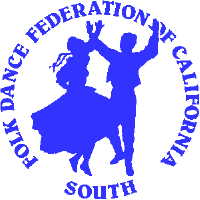
|
Folk Dance Federation of California, South, Inc.
|

|
CLICK IMAGE TO ENLARGE
Hasap, Khasap, Kasak, and Katsap are various ways of spelling the Turkish word for "butcher," which has given its name to a style of two dances – the slow and fast Hasapikos of the Greeks. The slow Hasapikos may have had its origin in the Turkish Zeybek, or the Greek Zeimbekikos forms set to a new rhythm and styling. However, the fast Hasapikos is a very common-place dance form, whose steps are employed by many groups and mostly under the title of Hora or Oro. This fast form will be found among the Ukrainians, Moldavians, Romanians, Bulgarians, Yugoslavs, Albanians, Turks, Israelis, and, of course, the Greeks.
But while to the American and Balkan dancer, upon hearing the word Hasapikos, brings to mind either the languid slow and graceful, and often very virile dance forms, or those of the exuberant fast paces, the same word has an entirely different connotation to the Northeastern Europeans.
The Hasapikos may have been danced by butchers, but also by all the common folk. No training was needed to enter a Hasapikos circle. Men put their arms around the neighbors' waists, necks, or shoulders, and just traveled along vigorously, happily, and exuberantly. To the high Turkish society it may have seemed like a graceless dance, as if a bunch of butchers, uncouth and untrained, would dance, and so it acquired its name.
The butcher of then, with his bloody hands and illiteracy, was not deemed to be a part of the higher strata of the society. It was a trade that was looked down upon. This feeling was carried over into the vocabulary of the Russians and other nations under Russian domination. For instance, in Lithuania no one ever saw a Turk, or a Turkish butcher, or ever heard of a dance by the name Hasapikos. However the word was there and used often when desiring to denote that the behavior of a certain person was that of a Hasap (Katsapas, Katsap), ill-mannered, and uncouth. On several occasions I heard that expression among Lithuanians in Los Angeles. Sometimes, when watching a group do a fast Hasapikos, one wonders whether their behavior in the circle is that of a bunch of Hasaps. However, whatever it may have meant and the reasons for it in the far past, nowadays, it is a happy, peppy dance – exhilarating and ever fun to do.
Reprinted from "What's in a Name?" by Vyts F. Beliajus
Viltis Magazine, June-September 1974, Volume 33, Number 2, V. F. Beliajus, Editor.